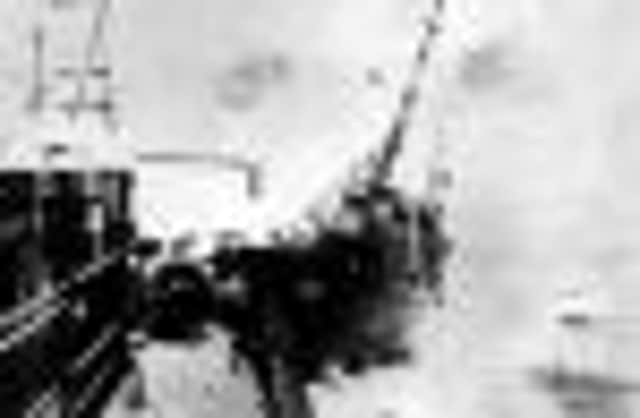‘£1,000 is an insult’ says Cod War veteran


Charles Grimmer was one of hundreds of Aberdeen-based deep sea trawlermen who were thrown out of work without a penny in the late 1970s after Britain’s humiliating defeat in the final Cod War with Iceland.
While the boat owners shared in a massive compensation pool of £180 million from the government, the fishermen who worked for them left the industry empty handed.
Advertisement
Hide AdAdvertisement
Hide AdFollowing the publication of a damning report by a parliamentary watchdog, the government yesterday apologised for the errors made in running a government-funded compensation package and announced plans to award £1,000 each to the former trawlermen who failed to qualify under the 2009 pay-out scheme.
But Mr Grimmer, 83, a former deep-sea skipper who was awarded £20,000 under the previous scheme, dismissed the government’s action as “too little, too late” for the many trawlermen who lost their livelihoods.
He said: “I call it an insult – £1,000 is nothing. We have all been badly let down by the government and the owners. They could have done a lot more for the fishermen.”
Around 2,500 former deep-sea skippers and deckhands from Aberdeen and the English ports of Grimsby, Hull and Fleetwood who were denied previous payments are expected to each receive £1,000.
Julie Mellor, the Parliamentary and Health Service Ombudsman, states in her report to the Department for Business, Innovation and Skills: “I have found evidence of maladministration by the department in respect of the consultation conducted in respect of the proposed 2009 scheme which led to false expectations of what the 2009 scheme would deliver.
“This in turn caused an injustice when those reasonable expectations were not met.
“Whilst I am satisfied that the department’s failing in this regard were completely unintentional and well meaning, there can be no doubt that their failure to communicate effectively their intentions to the trawlermen during the consultation caused considerable aggravation and disappointment.”
Martin Donnelly, the department’s Permanent Secretary, said: “I am sorry that some applicants to the scheme expected to receive compensation but did not qualify, and others did not receive as much .”
Advertisement
Hide AdAdvertisement
Hide AdRichard Lochhead, the Scottish fisheries secretary, said: “This is welcome news indeed, and justice for those affected. It vindicates the efforts of our fishing communities over a long period of time, and people across the political spectrum who have worked to achieve this significant step forward. The priority now is ensuring that all those who are entitled to compensation receive it.”
BACKGROUND
The first Cod War between the UK and Iceland flared in 1958, when Iceland imposed a 12-mile limit around its coastline. The conflict pitted Icelandic patrol boats against the might of the British Navy before an uneasy peace was restored.
Fourteen years later the second Cod War erupted, when Iceland brought a 50-mile limit into force.
Net cutters were used to cut foreign vessels’ trawling lines and Britain’s deep-water fleet was forced to retreat from its traditional fishing grounds.